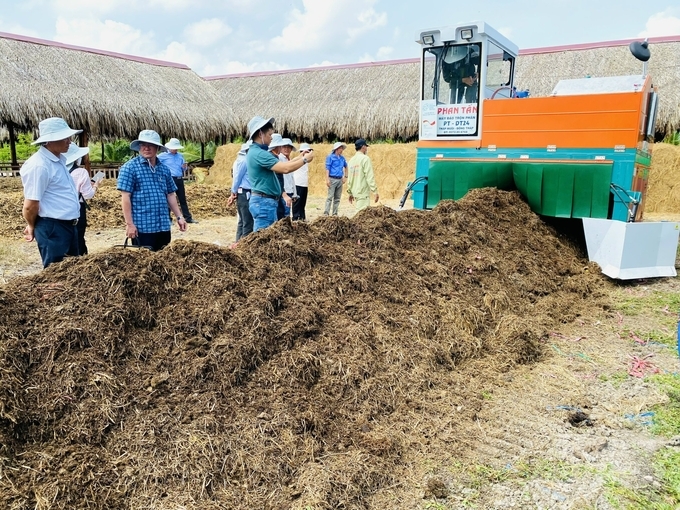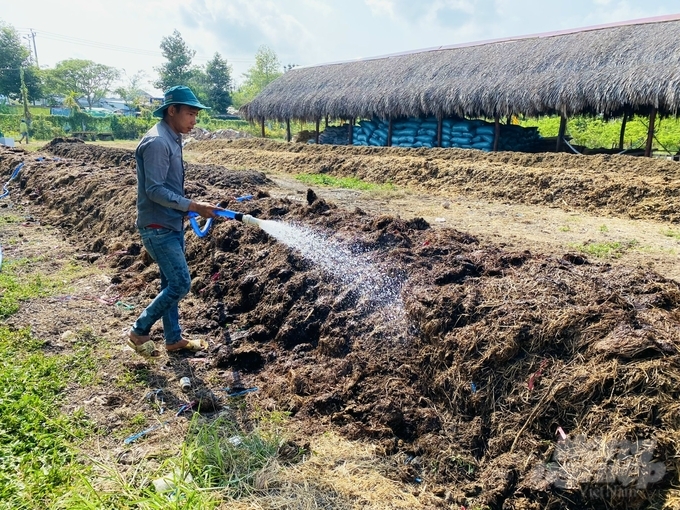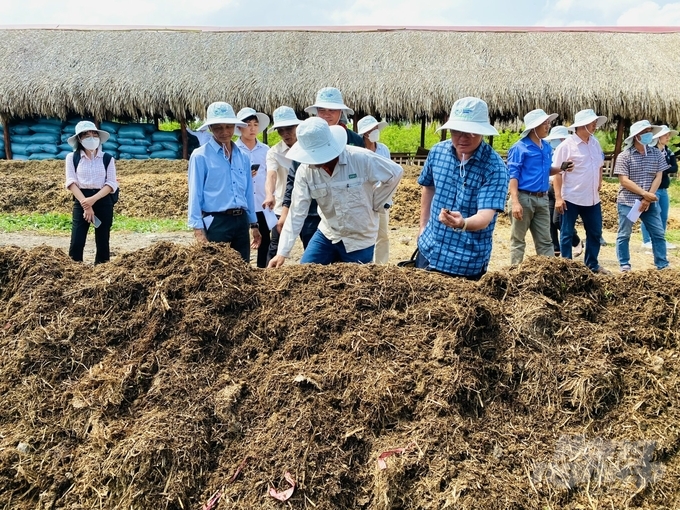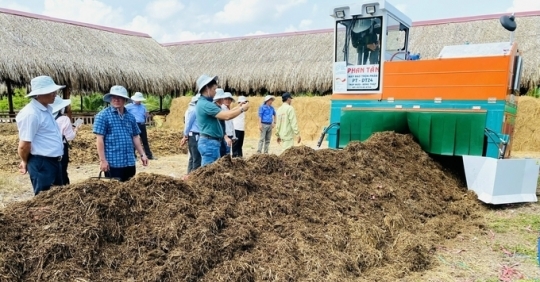[ad_1]
CAN THO Farmers in 4 provinces (Kien Giang, Dong Thap, An Giang and Can Tho City) are assisted with a mixer and instructed in the production of organic fertilizer from rice straw.
The Ministry of Agriculture and Rural Development of Can Tho City, in cooperation with German Development Cooperation (GIZ) and the International Rice Research Institute (IRRI), organized a training workshop on how to make organic fertilizer from rice straw and how to use a composting machine. for cooperatives from 4 provinces and cities including Kien Giang, Dong Thap, An Giang and Can Tho City.

GIC project supports 4 cooperatives in 4 provinces to obtain rice straw mixers to produce organic fertilizer, including Kien Giang, Dong Thap, An Giang and Can Tho City. Picture: Le Hoang Vu.
This project is part of the Global Program of Green Innovation Centers in Agriculture and Food (GIC Vietnam) Vietnam Support Package, which is part of the Ministry-funded global One World, No Hunger initiative for economic cooperation and Development of the Federal Republic of Germany (BMZ).
The project focuses on developing the capacities of farmers and agricultural advisors using innovative approaches such as: Farmer Business Class (FBS), SRP training package and capacity development. In addition, GIC Vietnam also supports the use of advanced machinery in the rice value chain. The new model of rice straw composting machine is a promising approach for specific straw decomposition, helping farmers and cooperatives reduce input costs, increase income and improve soil fertility.
To continue providing technical support in the production of compost from straw, the GIC project is collaborating with and through IRRI to support training in production techniques and building business models for 4 cooperatives in 4 provinces that will receive the machine, including: Kien Giang, Dong Thap, An Giang and Can Tho, and in coordination with the project partner Phan Tan Mechanical Company, to train machine operation.

The Nhan Loi Agricultural Service Cooperative is supported by the GIC project with machines and technical instructions to produce organic fertilizer from rice straw. Picture: Le Hoang Vu.
Can Tho City is one of four provinces in the Mekong Delta implementing the component of the GIC Vietnam project to support the use of composting machines for rice straw management cooperatives in the field and help create a source of organic fertilizer for crops create that help reduce pollution and produce safer agricultural products.
Mr Nguyen Tan Nhon, Deputy Director of the Ministry of Agriculture and Rural Development of Can Tho City, said: Organic agricultural production is a topic that agribusiness is interested in and focusing on promotion as organic production is just beginning to develop adapted to climate change. climate change and at the same time contribute to increasing the value of agricultural products.
In 2023, Can Tho’s agricultural sector will focus on disseminating recommendations to farmers to use the available rice straw in the field to process it into organic fertilizer to re-fertilize fields and crops. This will help farmers lower production costs and reduce chemical fertilizer use, especially in the context of very high chemical fertilizer prices. By doing this, you will help farmers gradually change the way they produce, limit the use of fertilizers and chemical pesticides, and gradually transition to green, organic, circular, and eco-friendly agriculture.

Organic farming is a concern and a promotion of agriculture. Picture: Le Hoang Vu.
Nhan Loi Agricultural Service Cooperative (Thanh Loc, Vinh Thanh, Can Tho City) is one of the agricultural cooperatives in the Mekong Delta which is supported by the GIC project with an organic fertilizer mixer and produces an average of nearly 500 tons of rice per crop In den In the following years the production can increase to 1,000-1,500 tons of organic fertilizer/plants.
Mr. Tieu Ngoc Loi, director of Nhan Loi Agricultural Service Cooperative, said happily, At present, after rice harvest, farmers often burn fields to pollute the environment or bury straw, which is easily poisoned by organic matter in the field. For this reason, the cooperative used the straw mushroom quality to increase income, and then mixed the mushroom-rotted straw with leftover vegetables, discarded vegetables and cow dung to rot for 2-3 months. . Then use the machine to break down the fertilizer that can be used to fertilize the plants.
Regarding organic fertilizer production, Mr. Loi said that organic fertilizer production is a new trend that farmers increasingly need to fertilize crops, thereby contributing to safe and economical agricultural products.
[ad_2]
Source link

